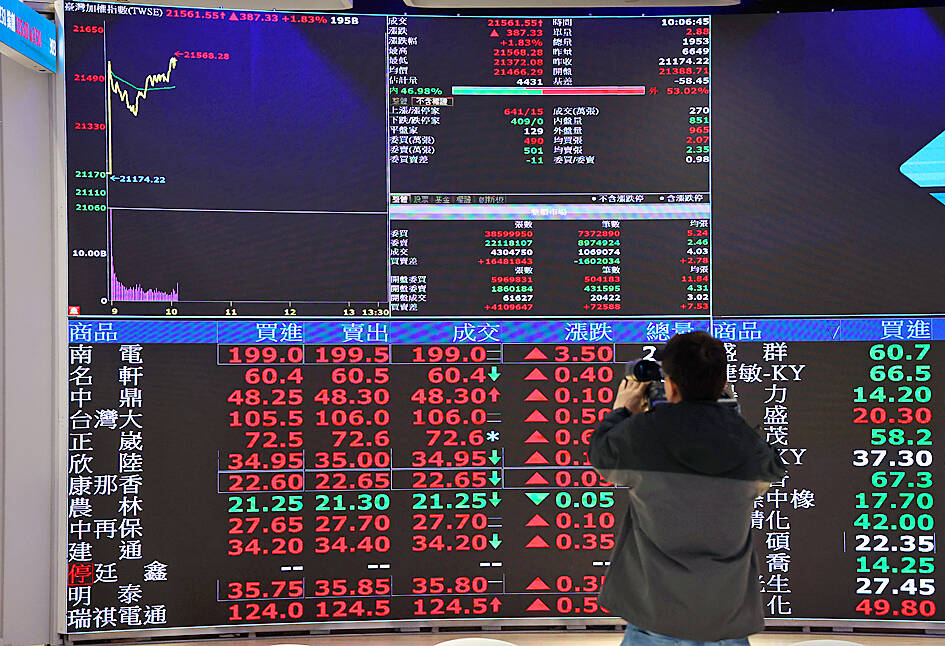Foreign funds snapped a two-month selling streak of Taiwanese equities last month amid renewed optimism around artificial intelligence (AI).
Overseas investors bought US$2.7 billion of Taiwanese shares, according to Bloomberg-compiled data.
That is a turnaround from when they sold stocks in March and April as Taiwan Semiconductor Manufacturing Co (TSMC, 台積電) cautioned over persistent weakness in consumer markets and funds rotated to rival South Korea.

Photo: CNA
Sentiment in chip stocks has recovered globally following another bullish forecast from AI chipmaker Nvidia Corp. Taiwan’s dominant position in the AI value chain would get another boost this week as tech giants gather for the nation’s annual electronics showcase event, Computex Taipei.
“Alongside Nvidia’s optimism, there was some cautious positioning on Taiwan earlier in the year which has eased,” Bloomberg Intelligence strategist Marvin Chen said. “While valuations are getting stretched, Taiwan is still Asia’s best proxy for the AI boom.”
Taiwan was the biggest recipient of foreign inflows last month among emerging Asian countries excluding China. That helped fuel a rally in TAIEX to a record high late last month and pushed the benchmark index to become one of the best performers in Asia this year.
Yesterday, the TAIEX moved sharply higher amid enthusiasm over AI development after a speech by Nvidia CEO Jensen Huang (黃仁勳) in Taipei a day earlier. The index closed up 362.54 points, or 1.71 percent, at 21,536.76.
TSMC, which is believed to provide advanced chips for Nvidia’s graphics processing units, led the gains throughout the session and closed 3.05 percent higher at NT$846.
Turnover on the main board totaled NT$433.32 billion (US$13.38 billion) yesterday, with foreign institutional investors buying a net NT$2.9 billion in shares, Taiwan Stock Exchange data showed.
There is still scope for global funds to keep buying given that foreign ownership of TSMC — the largest stock on the index with a weighting of 32 percent — is below the record 80 percent level seen in 2017.
A strong earnings outlook for Taiwanese firms also bodes well for foreign flows into the market. The 12-month forward profit estimate for the TAIEX has risen by more than 8 percent this year compared with little change on the MSCI Asia Pacific Index, data compiled by Bloomberg showed.
A delay in the US Federal Reserve’s rate cuts might still dent the tech rally, while any escalation in cross-strait tensions might deter foreign interest in Taiwan’s stock market.
“Strength of Nvidia and the underlying AI/server theme continue to support associated stocks in Taiwan,” Robeco Hong Kong Ltd Asia Pacific equities head Joshua Crabb said.
Stocks also remain attractive to foreign investors as they “are a lot cheaper than US counterparts,” he added.
Additional reporting by CNA

SEEKING CLARITY: Washington should not adopt measures that create uncertainties for ‘existing semiconductor investments,’ TSMC said referring to its US$165 billion in the US Taiwan Semiconductor Manufacturing Co (TSMC, 台積電) told the US that any future tariffs on Taiwanese semiconductors could reduce demand for chips and derail its pledge to increase its investment in Arizona. “New import restrictions could jeopardize current US leadership in the competitive technology industry and create uncertainties for many committed semiconductor capital projects in the US, including TSMC Arizona’s significant investment plan in Phoenix,” the chipmaker wrote in a letter to the US Department of Commerce. TSMC issued the warning in response to a solicitation for comments by the department on a possible tariff on semiconductor imports by US President Donald Trump’s

The government has launched a three-pronged strategy to attract local and international talent, aiming to position Taiwan as a new global hub following Nvidia Corp’s announcement that it has chosen Taipei as the site of its Taiwan headquarters. Nvidia cofounder and CEO Jensen Huang (黃仁勳) on Monday last week announced during his keynote speech at the Computex trade show in Taipei that the Nvidia Constellation, the company’s planned Taiwan headquarters, would be located in the Beitou-Shilin Technology Park (北投士林科技園區) in Taipei. Huang’s decision to establish a base in Taiwan is “primarily due to Taiwan’s talent pool and its strength in the semiconductor

Industrial production expanded 22.31 percent annually last month to 107.51, as increases in demand for high-performance computing (HPC) and artificial intelligence (AI) applications drove demand for locally-made chips and components. The manufacturing production index climbed 23.68 percent year-on-year to 108.37, marking the 14th consecutive month of increase, the Ministry of Economic Affairs said. In the first four months of this year, industrial and manufacturing production indices expanded 14.31 percent and 15.22 percent year-on-year, ministry data showed. The growth momentum is to extend into this month, with the manufacturing production index expected to rise between 11 percent and 15.1 percent annually, Department of Statistics

An earnings report from semiconductor giant and artificial intelligence (AI) bellwether Nvidia Corp takes center stage for Wall Street this week, as stocks hit a speed bump of worries over US federal deficits driving up Treasury yields. US equities pulled back last week after a torrid rally, as investors turned their attention to tax and spending legislation poised to swell the US government’s US$36 trillion in debt. Long-dated US Treasury yields rose amid the fiscal worries, with the 30-year yield topping 5 percent and hitting its highest level since late 2023. Stocks were dealt another blow on Friday when US President Donald